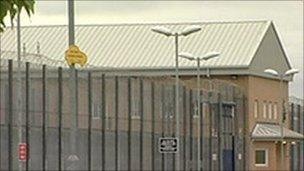HMP Whatton sex offenders 'wait two years for treatment'
- Published

HMP Whatton in Nottinghamshire is a Category C prison for sex offenders
Sex offenders at a Nottinghamshire prison are waiting up to two years for treatment because of "inadequate" funding, a prison watchdog says.
HMP Whatton faced a "a considerable backlog" with 250 of its 840 inmates treated last year, the Independent Monitoring Board said.
The IMB said the behaviour programmes were a key part of the prison's rehabilitation scheme.
A prison spokesman said it was looking at increasing treatment programmes.
An HM Inspectorate of Prisons report has confirmed the funding for sex offender treatment at the prison was "inadequate", he added.
'Increase availability'
John Webster, of the prison's monitoring board, said the number of inmates on waiting lists for courses was "between two and five times higher - depending on the type of course - than the number of places actually available".
"Prisoners regularly tell us they have been waiting for up to two years to get on the course," Mr Webster said.
"Our concern is that people ostensibly come to Whatton to go on this sex offender treatment programme and because of cutbacks generally they sometimes have to wait for up to two years to get a place on the course."
The Ministry of Justice said it was looking to "increase the availability of treatment programmes and had created the Sex Offender Management Board to address this."
In a statement, it added: "As highlighted in the Independent Monitoring Board's report, HMP Whatton is operating well."
'Positive effect'
An IMB report said the prison offers "a range of offending behaviour programmes with particular focus on cognitive treatment, such as the Sex Offenders Treatment Programme, Thinking Skills Programme, Controlling Anger and Learning to Manage it (CALM)."
The prison, which has the largest sex offender treatment centre in Europe, also offers anti-libidinal drug therapy to about 60 prisoners.
The IMB said the drug treatment, which suppresses sexual thoughts and urges, was "encouraging" and was having "a positive effect" on inmates.
The medical treatment process, which started as a pilot scheme in 2009, is completely voluntary.
The IMB report praised staff at the prison but said a funding shortfall was to blame for lack of training.
- Published11 June 2012
- Published13 March 2012
- Published22 February 2012